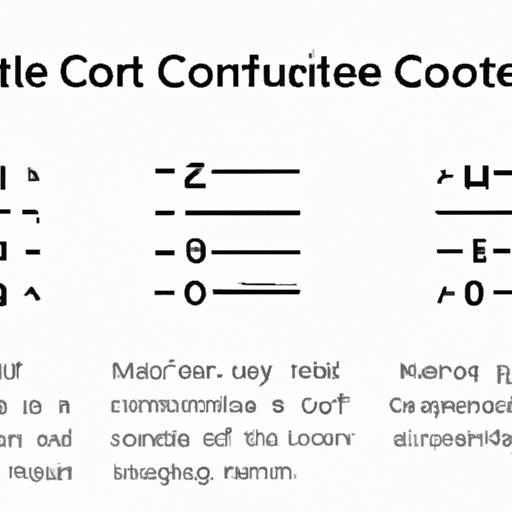Introduction
Data science is an interdisciplinary field that combines mathematics, computer science, and other related fields to analyze large datasets. Math is an integral component of data science, as it helps data scientists make sense of their data and draw meaningful insights from it. In this article, we will explore the relationship between data science and math and examine the level of math knowledge required for data science.
Exploring the Relationship between Data Science and Math
Data science is a rapidly growing field that requires a wide range of skills, including problem solving, coding, and mathematics. While it may not be immediately apparent, math plays a significant role in data science. To understand the role of math in data science, let’s first take a look at the basics of data science.
The Basics of Data Science
Data science is a field of study that involves the analysis and interpretation of large datasets. Data scientists use various tools, such as machine learning, statistical analysis, and data visualization, to uncover patterns and trends in data. They then use these insights to inform decision-making processes and solve real-world problems.
The Role of Math in Data Science
Math is an essential component of data science. It is used to quantify, measure, and interpret data. Math also helps data scientists identify patterns and trends in data, which can lead to valuable insights. Math is also used to construct algorithms and models that can help data scientists make predictions and decisions based on their data.

A Primer on How Much Math is Required for Data Science
The math requirements for data science vary depending on the specific field or application. Generally speaking, however, there are certain core math concepts that are essential for data science. These include linear algebra, calculus, statistics, probability, and optimization.

Core Math Concepts Needed for Data Science
Linear algebra is used to represent and manipulate data, such as vectors and matrices. Calculus is used to optimize models and understand the behavior of functions. Statistics is used to understand distributions and draw conclusions from data. Probability is used to assess the likelihood of events occurring. And optimization is used to find the best solutions to problems.
Understanding the Level of Math Knowledge Needed
It is important to note that the level of math knowledge required for data science varies depending on the type of data scientist you want to become. For example, if you want to specialize in machine learning, you will need a more advanced understanding of mathematics than someone who specializes in data engineering. However, all data scientists should have a basic understanding of the core math concepts mentioned above.

Examining the Benefits of Having a Math Background in Data Science
Having a strong math background can be extremely beneficial when working in data science. A good understanding of math can help data scientists enhance their data analysis skills, strengthen their problem solving abilities, and gain a better understanding of the underlying principles behind data science. Additionally, having a strong math background can help data scientists build models and algorithms more effectively.
Debunking Myths about Data Science and Math Requirements
There are many misconceptions and myths surrounding the math requirements for data science. One common misconception is that data science requires an extensive knowledge of mathematics. This is simply not true. While math is an important part of data science, it is not necessary to have an advanced degree in mathematics to succeed in the field.

Common Misconceptions about Math in Data Science
Another common misconception is that data science is only for people with a mathematical background. While having a good understanding of math can be beneficial, it is not a requirement for success in data science. There are many data scientists who do not have a strong math background, but they are still able to succeed in the field.
Addressing Common Concerns about Math in Data Science
Finally, many people are concerned that they do not have the math skills necessary to work in data science. However, it is important to remember that data science is a rapidly evolving field and new technologies and methods are constantly being developed. As such, it is possible to learn the necessary math skills without having a traditional math background.
What Types of Math are Needed for Data Science?
As previously mentioned, linear algebra, calculus, statistics, and probability are some of the core math concepts needed for data science. Additionally, data scientists may need to know other types of math, such as discrete mathematics and numerical analysis, depending on their area of specialization.

A Comprehensive Guide to Data Science and Math Requirements
If you are interested in pursuing a career in data science, there are several resources available to help you develop the necessary math skills. Online courses, tutorials, and books are great ways to learn the fundamentals of data science and the math concepts needed for it. Additionally, there are many free resources online, such as Khan Academy and Coursera, that offer courses in data science and mathematics.
Tips for Developing a Math Background for Data Science
Developing a math background for data science can feel daunting, but it doesn’t have to be. Here are a few tips to help you get started:
- Start with the basics: Begin by learning the fundamentals of math, such as arithmetic, algebra, and geometry.
- Practice makes perfect: Practice applying your math skills to data science problems to gain experience and confidence.
- Take advantage of online resources: There are countless online resources available to help you learn math for data science.
- Get help when you need it: Don’t be afraid to ask for help if you get stuck. There are many people who are willing to help.
Conclusion
Math is an essential component of data science and is used to quantify, measure, and interpret data. While the level of math knowledge needed for data science varies depending on the type of data scientist, there are certain core math concepts that are essential for success in the field. Having a strong math background can be beneficial for data scientists, as it can help them enhance their data analysis skills and strengthen their problem solving abilities. Finally, there are many resources available to help those interested in data science develop the necessary math skills.
(Note: Is this article not meeting your expectations? Do you have knowledge or insights to share? Unlock new opportunities and expand your reach by joining our authors team. Click Registration to join us and share your expertise with our readers.)
